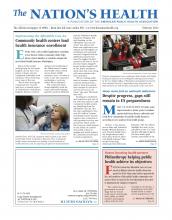Less than half of diabetic Americans who have eye damage are aware of the link between the disease and eye health, a recent study found.
The study, published online Dec. 19 in the Journal of the American Medical Association Ophthalmology, found that only about 45 percent of adults with diabetes knew the disease puts them at higher risk for vision problems. And only about 60 percent had an eye exam in the year leading up to the study.
“I was disheartened,” study leader Neil Bressler, MD, a professor of ophthalmology at the Johns Hopkins University School of Medicine, told The Nation’s Health. “And yet now we know our challenge, so we’re going to take that challenge and try and improve on it.”
People with poorly controlled diabetes are at risk for high blood sugar levels that can damage the small blood vessels in the retina, which is the light-sensitive tissue that lines the back wall of the eye. That damage can cause poor blood flow or leaking of fluids from those blood vessels, resulting in swelling of the retina. The condition is known as diabetic macular edema, which can lead to permanent vision loss.
Treatment for the condition has improved dramatically in recent years, Bressler said. In more than 95 percent of cases, treatment is successful. That is an improvement from about 80-85 percent just a few years ago, he said.
Early detection, though, is critical, Bressler said. Among patients who have already lost some vision due to diabetic macular edema, treatment results in substantial improvement for about half of them.
“The biggest problem is, this tends to cause impairment at a level where you would not be able to read or not be able to drive,” said Bressler, chief of the retina division at the Johns Hopkins Wilmer Eye Institute. “That’s obviously not good for our quality of life.”
People with diabetes have at least a 10 percent risk of developing diabetic macular edema. Bressler said about 700,000 adults in the United States probably have the eye condition.
“Is it every person with diabetes? No,” Bressler said. “Is everyone with diabetes at risk for it? Yes.”
In the study, about 30 percent of people with diabetic macular edema already had some vision loss. Of the diabetics older than 40 who had diabetic macular edema, less than half had seen a health care provider for diabetes care in the previous year.
Eye care is especially important as people age, Bressler said, not only among diabetics but for all adults.
“There are treatable things that happen commonly,” he said. “There can be things identified before you or I notice changes in our vision.”
Areas ripe for future study, he said, include whether eye care is underutilized not only among people with diabetes but over the entire population and how insurance coverage might help improve access to eye care.
What is clear, he said, is that there is a need to inform the public and health providers about the increased risk for eye problems among people with diabetes.
“We need now to get the word out on what the problem is,” he said.
The study was based on data collected between 2005 and 2008 from Americans enrolled in the National Health and Nutrition Examination Study. To access the study, visit http://archopht.jamanetwork.com/article.aspx?articleid=1792856&resultClick=3.
- Copyright The Nation’s Health, American Public Health Association









